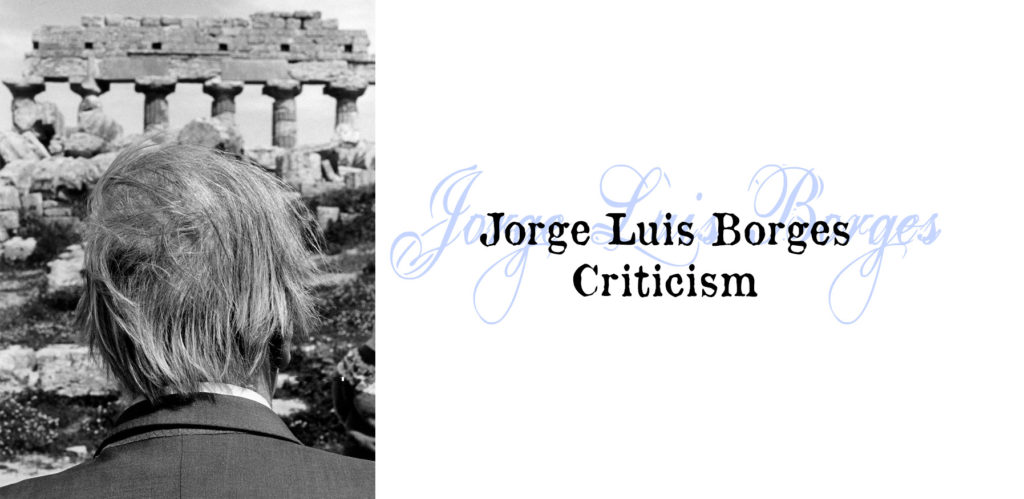Borges Criticism – Poetics
- At August 13, 2023
- By Great Quail
- In Borges
 0
0
Thirst to know things only known to God,
Judah León shuffled the letters endlessly,
trying them out in subtle combinations
Till at last he uttered the Name that is the Key.
—Jorge Luis Borges, “The Golem”
Borges Criticism: Poetics
This page collects English-language criticism that focuses on Borges’ poetry and poetics. (A complete list of Borges Criticism can be accessed at the bottom of the page.) The books are listed in chronological order of publication. Clicking the image of a book takes you directly to Amazon.com. Wherever possible, links to the Internet Archive are provided. These “online editions” may or may not match the exact edition of the corresponding book.
Each book contains a brief description and a summary of its contents. Some have also been reviewed. If any knowledgable visitor would like to submit comments for any of the “unreviewed” works, please contact the Garden!
Borges’ Ultraist Movement and Its Poets
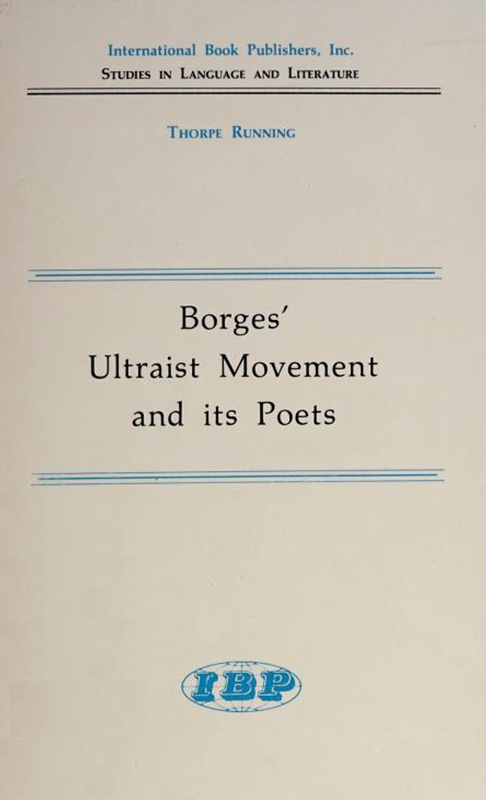
Borges’ Ultraist Movement and Its Poets
By Thorpe Running
International Book Publishers, 1981
Online at: Internet Archive
Thorpe Running (1941–2010) was an American scholar of Latin American poetry who taught at the University of Wisconsin, Concordia College, and finally St. John’s University and the College of St. Benedict. Living up to his amazing name, he was a marathon runner and a triathlete until 1999, when he became paralyzed in a near-fatal bicycling accident. He retired from teaching in 2005. Borges’ Ultraist Movement and Its Poets was the first of two books Running published that discussed Borges.
Table of Contents:
Preface
I. Introduction: Spanish Ultraism
II. Ultraism in Buenos Aires
III. Pure Ultraism: Eduardo Gonzáles Lanuza and and Nora Lange
IV. The Ultraist Middle Course: Bernárdez and Marechal
V. The Outer Edges of Ultra: Molinari and Girondo
VI. A Postscript on Güiraldes and the Precursors of Ultraism in Argentina
Notes
Bibliography
Reviews: R.K. Britton’s review of Borges’ Ultraist Movement and Its Poets was published in The Modern Language Review, Vol. 80, No. 4 (Oct. 1985): pp. 965–967, [JSTOR paywall]. A very positive review, Britton concludes: “This is, to sum up, an unpretentious book, which nevertheless impresses with the soundness of its judgements and its author’s capacity to take the broad view when it is needed. Thorpe Running has drawn deserved attention to one of the few avant garde movements in the arts during the 1920s which withstood the impact of Surrealism and, in English at least, he has filled a gap that has perhaps stood for too long.”
Borges the Poet
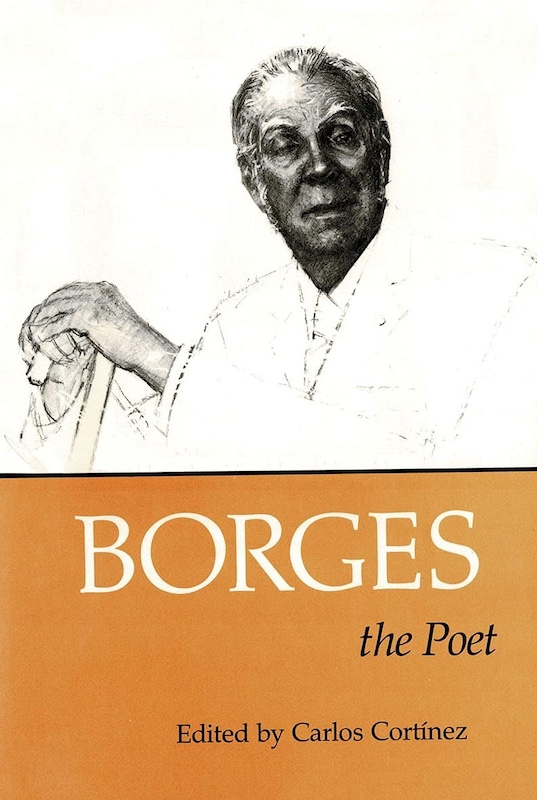
Borges the Poet
Edited by Carlos Cortínez
University of Arkansas Press, 1986
Online at: Internet Archive
Edited by the Chilean poet Carlos Cortínez, this volume collects papers from the James Henry Morgan lecture series at Dickinson College in 1983, which Borges had attended.
Table of Contents:
The Morgan Lectures: Discussions with Borges
I. Emily Dickinson
II. Hispanic Literature
III. English and North American Literature
The Poetry Itself
I. On Borges’ Poetry
-
- Thorpe Running, “The ‘Secret Complexity’ of Borges’ Poetry”
- Arturo Echavarría Ferrari, “From Expression to Allusion: Towards a Theory of Poetic Language in Borges”
- José Miguel Oviedo, “Borges: The Poet According to His Prologues”
- Willis Barnstone, “Borges, Poet of Ecstasy”
- Ramona Lagos, “The Return of the Repressed: Objects in Borges’ Literature”
- Jaime Alazraki, “Enumerations as Evocations: On the Use of a Device in Borges’ Latest Poetry”
II. Borges and Poetic Traditions
-
- Graciela Palau de Nemes, “Modernismo and Borges”
- María Kodama, “Oriental Influences in Borges’ Poetry: The Nature of the Haiku and Western Literature”
III. Borges and Other Poets
-
- Christopher Mauer, “The Poet’s Poets: Borges and Quevedo”
- Kenneth Holditch, “Borges and Emerson: The Poet as an Intellectual”
- Julie Jones, “Borges and Browning: A Dramatic Dialogue”
- María Luisa Bastos, “Whitman as Inscribed in Borges”
- James M. Hughes and Carlos Cortínez, “Where Do You Stand with God, Ms. Dickinson, Señor Borges?”
- D.L. Shaw, “Some Unamunesque Preoccupations in Borges’ Poetry”
- Dionisio Cañas, “The Eye of the Mind: Borges and Wallace Stevens”
- Nicholas Shumway, “Eliot, Borges, and Tradition”
IV. On Borges’ Poetry Collections
-
- Joan White, “Allegory in Dreamtigers and the Theory of Reality”
- Ana Cara Walker, “Borges’ Milongas: The Chords of Argentine Verbal Art”
- Thomas E. Lyon, “Intimations on a Possible Immortality: Ambiguity in Elogio de la sombra”
- Alice Poust, “Knowledge in Borges’ La moneda de heirro”
- Miguel Enguídanos, “Seventeen Notes Towards Deciphering Borges”
V. On Borges’ Poems and Characters
-
- Daniel Balderston, “Evocation and Provocation in Borges: The Figure of Juan Muraña”
- Francisco Cevallos, “The Poems of the Gifts: The Inverted Image”
- Robert Lima, “Knight, Death and the Devil: Dürer’s Imprint on Two Poems by Borges”
The Poetry and Poetics of Jorge Luis Borges
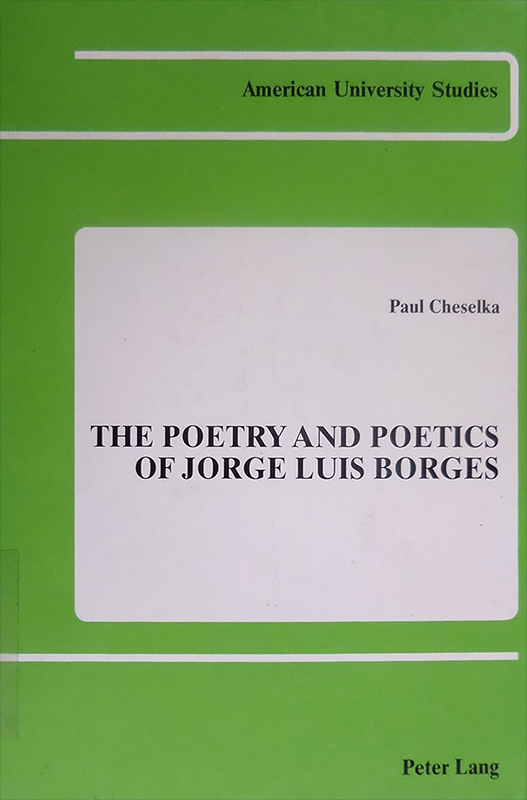
The Poetry and Poetics of Jorge Luis Borges
By Paul Cheselka
Peter Lang, 1987
Online at: Internet Archive
Paul Cheselka is a professor at DePaul University in Chicago, where he specializes in “Spanish and Spanish-American literature, Hispanic poetry, modernism, avant-garde movements, Borges, and peninsular generations of 1898 and 1927.” I believe this is his only published book, also known by the catchy title of “American University Studies, Series II: Romance Languages and Literature, Vol. 44.”
Publisher’s Description: This study traces Borges’ career as a poet from his earliest poetic endeavors before the 1923 publication of Fervor de Buenos Aires through the middle of the 1960’s. Paul Cheselka considers Borges’ better-known poetry collections, such as Fervor de Buenos Aires, Luna de enfrente, and Cuaderno San Martín; and he shows the often-neglected 1930-1960 period to be an important phase in the evolution of Borges’ poetry. The poems are studied chronologically with particular emphasis on the relation of their themes to the poet’s life and ideas. Cheselka’s contribution is that of providing a clearer delineation of Borgesian poetics; the poems themselves are shown to be the evidence and very substance of the poet’s definitions.
Reviews: John King’s review of The Poetry and Poetics of Jorge Luis Borges was published in the Bulletin of Hispanic Studies, Vol. 66, Issue 4, (Oct. 1989): pg. 396, [ProQuest paywall].
Borges and the European Avant-Garde
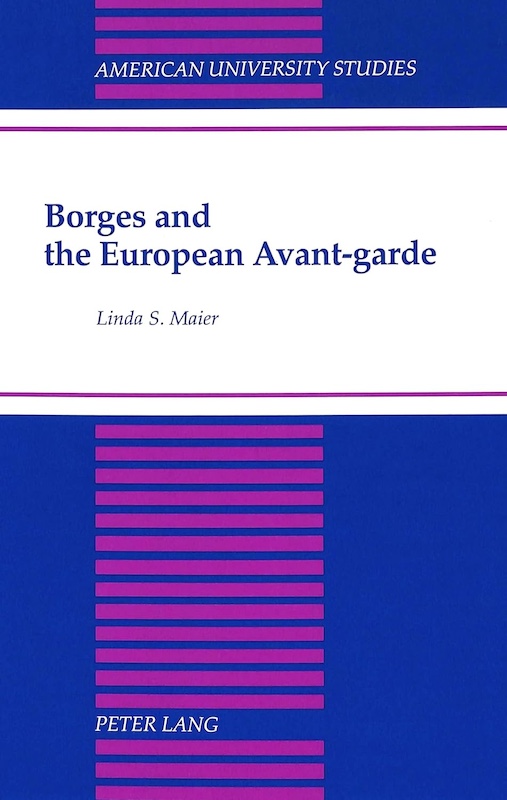
Borges and the European Avant-Garde
By Linda S. Maier
Peter Lang, 1996
Professor emeritus of Spanish, World Language & Culture at the University of Alabama in Huntsville, Linda Maier specializes in poetry and Latin American literature, with a particular focus on love, sexuality, and the voices of Hispanic women. Borges and the European Avant-Garde is her first full-length book.
Publisher’s Description: This study examines Borges’ association with the European avant-garde during the late 1910s and early 1920s. It explores the Argentine author’s literary origins under the tutelage of the avant-garde, his earliest publications in Spanish journals, and his decisive role in the Ultraist movement, whose ideas shaped his early career and channeled his subsequent literary development. Maier’s analysis and interpretation of these early texts document Borges’ career as an avant-garde theorist and poet. This book explains the pertinence of Borges’ literary apprenticeship to his later works and establishes the basic unity of his writing. “Maier assembles for the first time many of Borges’ earliest texts, poems and manifestoes published in Spain between 1919 and 1926. Her book sheds needed light on Borges’ participation in European avant-garde literary movements, and lucidly points out Ultraist tendencies in his mature work.” —Mary L. Friedman, Wake Forest University.
Reviews: Cristina Parodi’s review Borges and the European Avant-Garde was published in Variaciones Borges, No. 8 (1999): pp. 239–241, [Spanish. JSTOR paywall].
The Critical Poem:
Borges, Paz, and Other Language-Centered Poets in Latin America
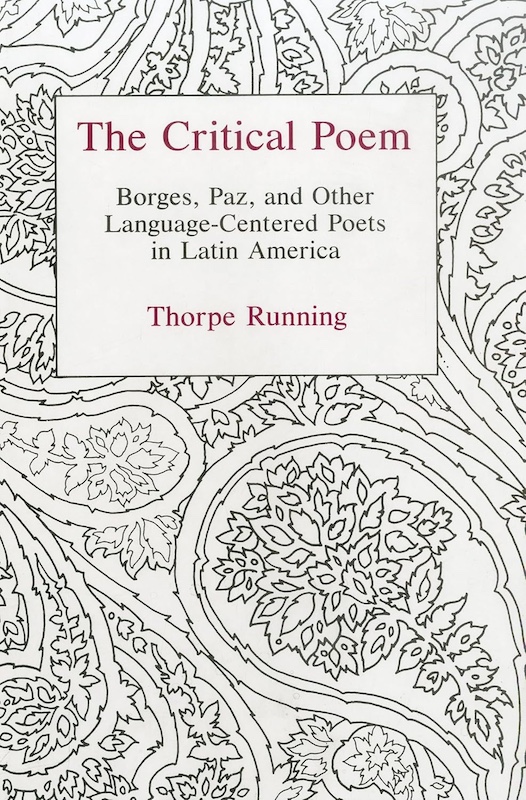
The Critical Poem: Borges, Paz, and Other Language-Centered Poets in Latin America
By Thorpe Running
Bucknell University Press, 1996
Online at: Internet Archive
Published in 1996 by Bucknell University Press, Thorpe Running’s The Critical Poem examined eight twentieth-century Latin American poets through a poststructuralist lens. The following description of the book was taken from the original dust-jacket:
In this book, scholar Thorpe Running shows that a skeptical approach to both language and poetry places eight poets from three countries in Latin America within a strain of poetry prefigured by Stéphane Mallarmé. Octavio Paz, Jorge Luis Borges, Roberto Juarroz, Alejandra Pizarnik, Alberto Girri, Juan Luis Martínez, Gonzalo Millán, and David Huerta span three different generations. In addition to their age and geographical differences, their poetry bears no obvious similarities. All eight, however, are poetas pensantes, or thinking poets, and underlying the work of these probing writers is the disturbing question: Does language do what it is supposed to do? The answer is negative for all these poets who see their poems as being made up of words that don’t work.
“The critical poem,” a term Octavio Paz takes from Mallarmé, describes the exploratory or even “explosive” poetry these impressive writers produce, as it portrays a text that undermines its own language and foundation. Winner of the 1990 Nobel Prize for Literature, Paz is known for his thoughtful, probing essays, and for eclectic, ever-developing poetry. This study, however, is the first to focus on his long-standing concern for the difficulties of language and of poetic expression. Jorge Luis Borges, well-known throughout the world for his philosophical approach to both fiction and poetry, shares with the other critical poets a complete awareness of language and its problems.
Roberto Juarroz, ever since his first book of poems was published, has not only centered his poetry on language and its problems, he has taken on this topic so specifically that his texts often express concerns central to Jacques Derrida, perhaps the leading poststructuralist theoretician. Even more overtly critical is the work of Alberto Girri, whose texts explore concerns central both to language and to literary theory—especially that of Murray Krieger, the North American theoretician.
Gonzalo Millán’s poetry of “objectivity” at first seems to disregard more philosophical approaches, but his later texts present a progressively troubled albeit imaginative view of language-seeing words as slippery and transient. Juan Luis Martínez’s major work does not contain any pointed commentary on this problem. But his book, La Nueva novela (The new novel), provides a tangible example of the self-questioning nature of critical literature, as well as effective homage to Mallarmé, Alejandra Pizarnik’s work provides another good demonstration of the critical text, especially its oppositional nature.
David Huerta’s Incurable, a four-hundred-page poem, is a postmodern potpourri, full of playful references to such poststructuralist theoreticians as Derrida and Jacques Lacan, while at the same time expressing all the anxiety felt by a poet aware of language’s deficiencies. Besides pulling together the main philosophical and literary concerns that underlie the other critical poets’ work, Huerta’s long poem provides a good example of how to negotiate the dangers confronting the contemporary poet.
Table of Contents:
- The Critical Poem
- Octavio Paz and the Magic of the Word
- Roberto Juarroz: Exploding the Limit
- The New Novel by Juan Luis Martínez
- The Negative Poems of Alejandra Pizarnik
- Alberto Girri: Poetry About Poetry
- The “Secret Complexity” of Jorge Luis Borges’s Poetry
- Gonzalo Millán and “Objective Poetry”
- David Huerta: Incurable
- Conclusion
Reviews: Melanie Nicholson’s review of The Critical Poem was published in Chasqui, Vol. 29, No. 1 (May 2000): pp. 146–150, [JSTOR paywall]. The following excerpts describe Running’s approach to Borges and bring her review to its conclusion:
Running’s assessment of Borges focuses on the last twenty five years of his life, that is, from approximately 1960 to his death in 1986. Throughout this period, Borges, having long ago rejected the belief in the power of the metaphor as professed by the ultraistas, “kept trying, in a more unassuming way to discover—to rescue—the basis for a true poetic image.” This attempt led to what Borges himself called a “secret complexity” underlying an apparently ordinary language. Rather than signaling a lack of meaning, the poetic word for Borges evokes a vast range of meanings. If Borges’s poetry is critical, argues Running, it is not in the negative or pessimistic sense that readers associate with Alejandra Pizarnik, Alberto Girri, or Gonzalo Millán; rather, “for Borges the key is to understand all the pitfalls that underlie language, in order to consciously adopt a new, momentary naïveté, or a willing suspension of disbelief.”
[…]
In The Critical Poem, Running has identified an important strain in Latin American poetry of the latter decades of the twentieth century. As the author himself observes, “this body of philosophical poetic texts is as groundbreaking as were the novels of the well-known Boom…” The presentation of eight poets from various Latin American countries leaves little doubt as to the breadth of this language-centered trend. It could be argued, however, that certain of these poets characterize more definitively than others the overriding concern with poetic language that Running examines. Not surprisingly, it is Paz, Juarroz, and Borges to whom the author returns most often, creating a kind of dialogue between the essays that helps to concretize the argument. Consequently, the reader may find the essays on certain of the other poets (particularly Martinez and Millán) to be less seminal to the book’s overall argument.
Borges Criticism
Main Page — Return to the Borges Criticism main page and index.
General Criticism 1 — General literary criticism and commentary written during Borges’ life, 1957–1986.
General Criticism 2 — General literary criticism and commentary written from 1987 to 1999.
General Criticism 3 — General literary criticism and commentary written from 2000 to the present.
Comparative Criticism — Borges criticism that compares Borges with other writers or locates Borges’ work within a broader literary context such as genre fiction or Latin American Literature.
Political & Theoretical Criticism — Borges criticism with a strong political, theoretical, or philosophical component: Marxist critique, postmodernism, postcolonial studies, gender studies, queer theory, disability studies, etc.
Religious & Esoteric Criticism — Borges criticism from a religious, metaphysical, or esoteric perspective.
Scientific Criticism — Borges criticism within the disciplines of science, mathematics, and technology.
Author: Allen B. Ruch
Last Modified: 22 August 2024
Main Borges Page: The Garden of Forking Paths
Contact: quail(at)shipwrecklibrary(dot)com

